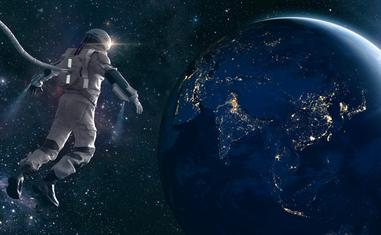The views expressed in our content reflect individual perspectives and do not represent the authoritative views of the Baha'i Faith.
The first person who ever urged us humans to attempt space travel propelled by rockets – the Scottish astronomer and Church of Scotland minister William Leitch – proposed his idea in 1861.
People thought he was crazy.
In his book “God’s Glory in the Heavens,” Leitch published an essay called “A Journey through Space,” where he gave the first modern scientific explanation of space flight. Leitch wrote:
The holy breathings of one devout heart, give to God more glory than the loudest anthems of the heavenly hosts. And the starry firmament has not been created in vain, while it teaches this great truth to all spiritual intelligences.
Many ridiculed him, but exactly a century later, on April 12, 1961, the Soviet cosmonaut Yuri Gagarin became the first human being to ride a rocket into orbit in space, making one revolution around the Earth.
Gagarin accomplished his historic orbit of the planet in exactly the way Leitch had first proposed a hundred years before.
The world now celebrates this major milestone in human history every April, initially called “Yuri’s Day” when it was first observed as a global party in 2001, then becoming the United Nations International Day of Human Space Flight ten years later in 2011. In 2021, we marked 60 years since that first flight out past the planet’s atmosphere.
Think about it: in just a handful of decades, God’s glory in the heavens came true. We escaped the bonds of gravity and atmosphere that have held us here since the beginning of our species.
Today, we’ve gone far beyond Gagarin’s single circumambulation. Men and women orbit our Earth every hour and a half or so, on the International Space Station (ISS), which travels continuously around the world at 17,000 miles an hour. If you look up on a clear night you can see it, the largest manmade object in space, with the naked eye. (Many apps, including this one, can tell you where and when to spot the ISS)
I love to go outside in the dark, stand on my porch, and watch the ISS fly by. Although it’s really just a highly-sophisticated machine guided by its international human crew, it still reminds me of this soaringly beautiful spiritual passage from Abdu’l-Baha’s writings:
O God! O God! This is a broken-winged bird and his flight is very slow – assist him so that he may fly toward the apex of prosperity and salvation, wing his way with the utmost joy and happiness throughout the illimitable space, raise his melody in Thy Supreme Name in all the regions, exhilarate the ears with this call, and brighten the eyes by beholding the signs of guidance.
As a species, we humans have definitely winged our way “with the utmost joy and happiness throughout the illimitable space.” So far, in our mere 60 years of exploration, about 500 people have gone into space. We’ve developed the science to slip the bonds of the natural world, to cross the barriers that no being has ever before broached.
RELATED: Is Our Universe Expanding? A Baha’i Look at Einstein’s Theory
Now, commercial companies like Blue Orbit, SpaceX, Virgin Galactic, and many others have already launched astronauts in successful missions to the ISS, and have begun testing for civilian space flights in the near-term future.
Which makes me wonder: what will we feel when we can experience the immensity of the cosmos, when we can see our earthly home as a single blue planet floating in space?
We can glean at least a partial answer to that question from Apollo 14 astronaut Edgar Mitchell, the sixth person to walk on the moon. During his return from that lunar mission in 1971, he had a profound spiritual realization while looking at the Earth out the window of his spacecraft, and it changed his entire life. Now known as “the overview effect,” multiple astronauts and cosmonauts have reported this kind of surprising, sudden shift of their spiritual awareness during their time orbiting our home planet in space. Mitchell said:
Something happens to you out there. You develop an instant global consciousness, a people orientation, an intense dissatisfaction with the state of the world, and a compulsion to do something about it.
Have you ever felt anything like what Edgar Mitchell felt – a pervasive sense of unity and harmony, a feeling of your oneness with all creation, a global consciousness?
People can feel some of that profound oneness during meditation, in our dreams, or when we gain the deep insight that allows us to see the overwhelming wholeness and beauty of creation. This strong perception of connectedness and oneness – called savikalpa samadhi in the Hindu scriptures, meaning a temporary dissolution of the individual consciousness into an encompassing awareness of the whole – gives us a glimpse of the truly unified reality of all living things.
The overview effect describes a cognitive and a spiritual shift in the recognition of our interdependence and fundamental unity with nature, with our planet, and with each other. Michael Collins, the Apollo 11 astronaut who recently passed away, said:
The thing that really surprised me was that it [Earth] projected an air of fragility. And why, I don’t know. I don’t know to this day. I had a feeling it’s tiny, it’s shiny, it’s beautiful, it’s home, and it’s fragile.
After Edgar Mitchell returned to Earth on Apollo 14, he and author Frank White collaborated on a book called “The Overview Effect – Space Exploration and Human Evolution,” which said:
The Overview Effect is a message from the universe to humanity. The message is that the Earth, when seen from orbit or the moon, is a whole system, where borders and boundaries disappear, and everything is interconnected. Our planet is a tiny spaceship in an enormous universe, which is itself a whole system, of which we are an important part.
White’s book and his subsequent founding of the non-profit Overview Institute led him to research the experiences of other astronauts, and he found that a whole host of them – including Yuri Gagarin, Sally Ride, Rusty Schweickart, and many others – reported that their trips into space had the same exact metaphysical impact on them:
From space, the astronauts tell us, national boundaries vanish, the conflicts that divide us become less important and the need to create a planetary society with the united will to protect this “pale blue dot” becomes both obvious and imperative.
RELATED: Stargazing to Understand Our Souls
The Overview Institute says as much in their declaration of vision and principles:
We live at a critical moment in human history. The challenges of climate change, food, water and energy shortages as well as the increasing disparity between the developed and developing nations are testing our will to unite, while differences in religions, cultures, and politics continue to keep us apart. … At this critical moment, our greatest need is for a global vision of planetary unity and purpose for humanity as a whole.
The Baha’i Faith and multiple Indigenous wisdom traditions have all taught us that we are one – that our separate selves, religions, and countries are illusory, and that we must develop planetary unity for the benefit of humanity as a whole. Abdu’l-Baha, in a speech he gave in 1912 to All Souls Unitarian Church in New York, put it this way:
… the world of humanity is one race, the surface of the earth one place of residence and … these imaginary racial barriers and political boundaries are without right or foundation. Man is degraded in becoming the captive of his own illusions and suppositions. The earth is one earth, and the same atmosphere surrounds it. No difference or preference has been made by God for its human inhabitants; but man has laid the foundation of prejudice, hatred and discord with his fellowman by considering nationalities separate in importance and races different in rights and privileges.
I hope that one day everyone who wants to go can travel far enough out into the vastness of space to see the whole Earth, since we could all benefit from experiencing the overview effect and recognizing our deep and abiding oneness.

















Comments
Sign in or create an account
Continue with Facebookor